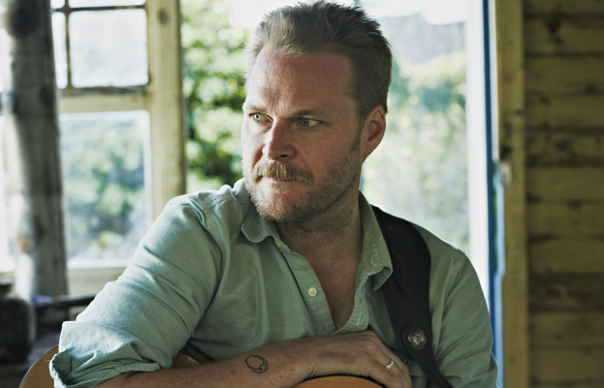On sunny days, the Beach Boys’ “Little Bird” often pops into Taylor’s head and, driving from Saralyn to a food co-op in Pittsboro, he starts singing the old Dennis Wilson song in his own distinctive way, chewing up the words and finding radical new syllables hidden in many of them. It’s a nasal, soulful style – downhome melisma, perhaps – familiar to anyone who’s heard the run of Hiss Golden Messenger albums that climaxed, last month, with Lateness Of Dancers. There are echoes, too, of Van Morrison and John Martyn in this “craggy-voiced patriarch”, as the writer Amanda Petrusich recently described Taylor.
“Mike’s voice is pretty singular,” says Brad Cook, another ex-member of Megafaun, who currently acts as Hiss Golden Messenger’s manager and occasional bassist, when he isn’t touring as part of Sharon Van Etten’s band. “It doesn’t take much to notice that anything he touches or covers immediately sounds like his own.” Chris Smith released three Hiss albums on his Paradise Of Bachelors label. “The cadence of Mike’s voice lines up directly with his playing and structure,” he says. “It can feel like nature or something animal, a great comfort, communicating alongside you.”
Taylor, 39, originally comes from Irvine, south of Los Angeles in Orange County. At home, he heard his father’s Byrds and CSNY albums but, by the time he joined his first band at the University Of California in Santa Barbara, he was playing a fraught, arty brand of hardcore, much influenced by the likes of Unwound and Rites Of Spring. Ex-Ignota released a few records in the mid-‘90s, and on Youtube you can find a film of them playing, skateboarding and embroidering their biographies that was directed by Jack Johnson (“We were buddies in college. The first time I saw his face on the side of a bus I was stunned.”). Within the band’s ranks, there was another student, Scott Hirsch, who remains Taylor’s musical lieutenant to this day.
“Mike looked like a cool person,” recalls Hirsch, speaking from the New York studio where he works on sound for films, “but it was one of those situations that didn’t have anything to do with what he could actually play. I remember going over to Mike’s place in these ghetto flats and he had an acoustic guitar with two strings on it. He kind of knew a couple chords, and that’s how it all began.
As their teens ended, Taylor and Hirsch increasingly felt that the strictures of hardcore were too confining. Ex-Ignota split in 1997, Taylor graduated early from college and found himself living back in Irvine with his parents. “I was sort of lost; I’ve had many periods of loss,” he notes ruefully. Letting his hair grow long and his beard scraggly, he stumbled into a job as a PE teacher. “I have no idea why they hired me. I looked insane, and also I don’t know the rules of any sports.”
At the same time, though, he was playing Gram Parsons records and learning the banjo, to some degree as a transgressive act: “Country music is pretty fucking weird if you’re into hardcore.” A year or so later, he drifted up to San Francisco, where Hirsch had relocated, and formed a new band with the bassist that they called The Court & Spark.
“We started from scratch, as an indie band that played countryish music. We wanted to do it in a way that felt respectful to the tradition, and at the same time not a sort of Civil War re-enactment. We put out several records, got a good press, we did a lot of touring, but we made zero money. And ultimately it was unsatisfying. It was not getting me where I wanted to go.”
Taylor’s amiable networking talents were already evident, with Linda Thompson and the Byrds’ Gene Parsons guesting on Court & Spark records (Paradise Of Bachelors’ Brendan Greaves recalls that, the first time they met, Taylor somehow produced a phone number for Augie Meyers of The Sir Douglas Quintet). A few years into the new millennium, though, leading a failing indie rock band with thwarted ambitions became strangely unappealing.
In 2006, as The Court & Spark slowly collapsed in on themselves, Taylor and Hirsch quietly reconfigured themselves into a looser, less formal project, which would soon be named Hiss Golden Messenger. “I didn’t want to have a band anymore,” says Taylor. “I asked Scott if he wanted to be involved, but I said, ‘It’s going to be different. All the risk will be on me, I’ll pay for everything, but also, I’m the one who’ll have the final say on everything.’ I’m not a dictator, but I just don’t think bands work, I really don’t. There’s so much wasted energy.”
The first Hiss album, Country Hai East Cotton (2009, recorded a couple of years earlier), was a lovingly hand-crafted artefact, released in a run of 500 on Taylor’s own label, Heaven & Earth Magic Recording Company. The music was lush and laidback – “Touchstones, as I see them, would be Traffic’s Low Spark Of High-Heeled Boys, possibly some live Dead, some vintage-era Tubby/Jammy,” Taylor wrote to me at the time. The pressure to succeed, though, had dissipated, so much so that the pair both left San Francisco to pursue postgraduate studies: Hirsch to work on Music Technology in New York; Taylor to investigate folklore at the University Of North Carolina in Chapel Hill.


